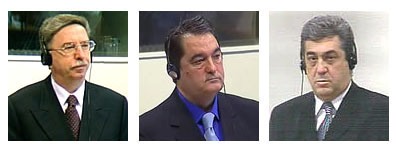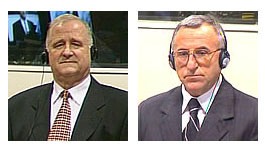The trial held special significance as the closest that an international criminal court was likely to come to judging the actions of the Milosevic government in Kosovo, a breakaway Serbian province. Mr. Milosevic died in 2006 before the end of his own trial before the same court, the United Nations International Criminal Tribunal for the Former Yugoslavia in The Hague.
The Kosovo war pitted Serbian forces against an ethnic Albanian separatist guerrilla group and led to a nearly three-month bombing campaign by NATO in 1999 aimed at stopping the conflict, which threatened the stability of the south Balkans.
NATO called it a humanitarian intervention. Its airstrikes, which drew both support and criticism, stopped after Serbian forces agreed to withdraw from Kosovo.
NATO’S bombing campaign was criticized by some Western lawyers and Russian politicians, who subsequently demanded that the tribunal charge NATO with war crimes as well. They said roughly 300 Serbs were killed by NATO bombs in such episodes as the bombing of a bridge as a passenger train was crossing, an attack on a refugee convoy and a strike against a Serbian television building in Belgrade.
NATO spokesmen at the time said that NATO officers had gone to great lengths to minimize civilian deaths, and Carla Del Ponte, the tribunal prosecutor, said that there was no evidence of a systematic attack on civilians by NATO.
Serbia has long argued that civilians in Kosovo were fleeing the bombing, not the atrocities that the men on trial in The Hague stood accused of ordering. But Judge Ian Bonomy, the Scottish jurist who read the summary, said that “none of the witnesses cited NATO bombing” as a reason for their flight.
In addition to endorsing NATO’s assertion that the refugees fled Serbian forces, the panel of judges came close to a guilty verdict for Mr. Milosevic.
Citing their reasons for acquitting Mr. Milan Milutinovic, the judges said that in practice “it was Milosevic, sometimes termed the Supreme Commander, who exercised actual command authority” over Serbian troops and security police officers in 1999.
The judges convicted the five others for their roles in “a broad campaign of violence directed against the Kosovo Albanian population,” which at the time made up 90 percent of Kosovo. They said Serbia had initiated a state-organized campaign to keep control over Kosovo through deporting or forcibly transferring a large part of the population of about two million.
At least 700,000 ethnic Albanians were expelled across the borders into Albania and other neighboring countries, and many were mistreated, killed, robbed, raped or had their houses burned and their identity papers confiscated, the court summary said.
Nikola Sainovic, the former Yugoslav deputy prime minister and “one of the closest and most trusted Milosevic associates,” according to the court, was sentenced to 22 years in prison. A former army general, Nebojsa Pavkovic, and the former chief of the Serbian security police, Gen. Sreten Lukic, were also given 22-year sentences. All three were found guilty of deportation, forcible transfer, murder and persecution.
Two other former generals, Dragoljub Ojdanic and Vladimir Lazarevic, were given 15-year prison terms for deportation and forcible transfer.
Any decision of the tribunal can be appealed, and a spokeswoman for the prosecution, Olga Kavran, said that prosecutors would study the lengthy judgment before deciding whether to accept the verdicts. On Thursday, the judges read out an hourlong summary, but their ruling is more than a thousand pages long and occupies four tomes.
Lawyers who have followed the trial said they were surprised at the acquittal of Mr. Milutinovic, who attended meetings of the wartime Supreme Defense Council and was informed of government actions. But the judges said that he had no authority over the armed forces and that although in theory he had oversight of the Serbian security police, he had no effective control.
The prosecution had presented Mr. Milutinovic as a trusted aide of Mr. Milosevic, but the judges said they found no evidence of close personal or professional ties. He voluntarily surrendered to the court in 2003 but was released several times for health reasons. In all, he spent nearly five years in jail before his release on Thursday. Lawyers for Mr. Sainovic and Mr. Ojdanic said they would appeal. One other Kosovo trial is still under way, involving Vlastimir Djordjevic, the once powerful chief of public security for Serbia and Kosovo. Prosecutors said he had long escaped arrest by hiding in the Russian Federation. His trial for crimes against humanity and murder began in January.
 Nikola Sainovic, Nebojsa Pavkovic, Sreten Lukic
Nikola Sainovic, Nebojsa Pavkovic, Sreten Lukic
 Dragoljub Ojdanic, Vladimir Lazarevic
Dragoljub Ojdanic, Vladimir Lazarevic
More info:
Case Milutinovic and others – In B/H/S language


